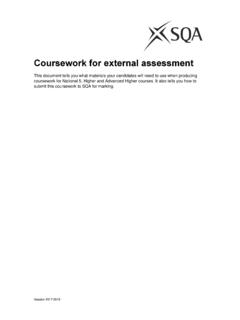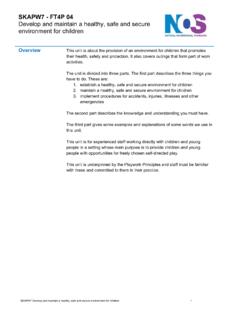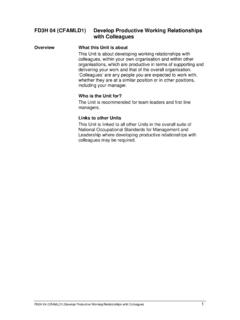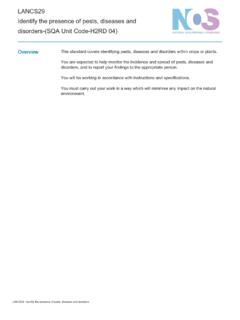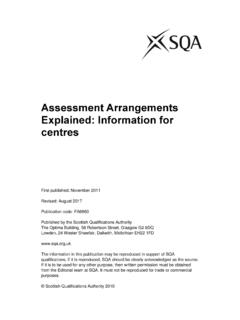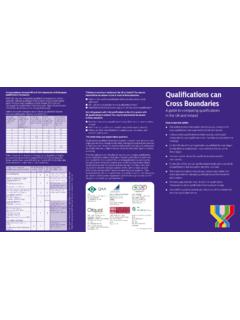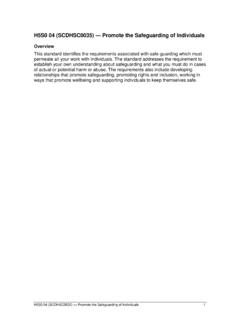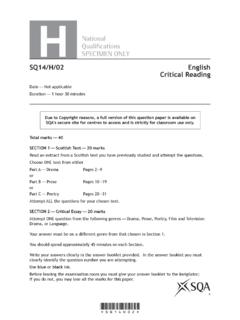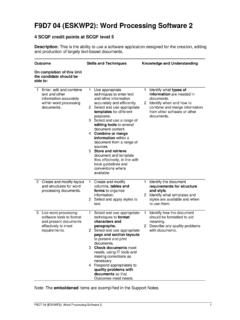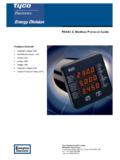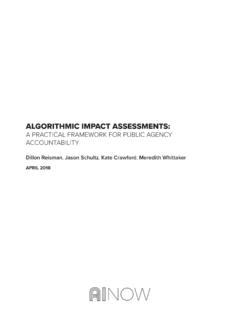Transcription of Higher History - SQA
1 Higher History Course code: C837 76 Course assessment code: X837 76 SCQF: level 6 (24 SCQF credit points) Valid from: session 2018 19 This document provides detailed information about the course and course assessment to ensure consistent and transparent assessment year on year. It describes the structure of the course and the course assessment in terms of the skills, knowledge and understanding that are assessed. This document is for teachers and lecturers and contains all the mandatory information you need to deliver the course. The information in this publication may be reproduced in support of SQA qualifications only on a non-commercial basis. If it is reproduced, SQA must be clearly acknowledged as the source. If it is to be reproduced for any other purpose, written permission must be obtained from This edition: August 2019 (version ) Scottish Qualifications Authority 2013, 2018, 2019 Contents Course overview 1 Course rationale 2 Purpose and aims 2 Who is this course for?
2 2 Course content 3 Skills, knowledge and understanding 3 Skills for learning, skills for life and skills for work 26 Course assessment 27 Course assessment structure: question paper 27 Course assessment structure: assignment 29 Grading 33 Equality and inclusion 34 Further information 35 Appendix 1: course support notes 36 Introduction 36 Developing skills, knowledge and understanding 36 Approaches to learning and teaching 36 Preparing for course assessment 54 Developing skills for learning, skills for life and skills for work 56 Appendix 2: the two-source comparative question (How much do about differing interpretations ) 58 Example question 1 58 Example question 2 59 Copyright acknowledgements 60 Example questions: marking instructions 61 Version 1 Course overview The course consists of 24 SCQF credit points which includes time for preparation for course assessment.
3 The notional length of time for candidates to complete the course is 160 hours. The course assessment has three components. Component Marks Duration Component 1: question paper 1 British, European and world History 44 1 hour and 30 minutes Component 2: question paper 2 Scottish History 36 1 hour and 30 minutes Component 3: assignment 30 1 hour and 30 minutes see Course assessment section Recommended entry Progression Entry to this course is at the discretion of the centre. Candidates should have achieved the National 5 History course or equivalent qualifications and/or experience prior to starting this course. Advanced Higher History course further study, employment and/or training Conditions of award The grade awarded is based on the total marks achieved across all course assessment components.
4 Version 2 Course rationale National Courses reflect Curriculum for Excellence values, purposes and principles. They offer flexibility, provide time for learning, focus on skills and applying learning, and provide scope for personalisation and choice. Every course provides opportunities for candidates to develop breadth, challenge and application. The focus and balance of assessment is tailored to each subject area. In this course, candidates develop a greater understanding of the world by learning about other people and their values, in different times, places and circumstances. The course helps candidates to develop a map of the past and an appreciation and understanding of the forces which have shaped the world today. Candidates have opportunities to develop important attitudes including an open mind and respect for the values, beliefs and cultures of others; openness to new thinking and ideas; and a sense of responsibility and global citizenship.
5 The course emphasises the development and application of skills. The focus on evaluating sources develops candidates thinking skills. They also develop skills in literacy through using and synthesising information in different ways. Purpose and aims Candidates acquire breadth and depth in their knowledge and understanding of the past through the study of British, European and world, and Scottish contexts in a variety of time periods. Options cover topics from the Medieval, Early Modern and Later Modern periods, and include elements of political, social, economic and cultural History . Candidates develop an approach and understanding that they can apply to other historical settings and issues. Candidates develop: a conceptual understanding of the past and an ability to think independently a range of skills including the ability to apply a detailed historical perspective in a range of contexts the skills of analysing various interpretations of historical sources and critically evaluating a variety of views an understanding of the relationship between factors contributing to, and the impact of, historical events the skills of analysing, evaluating and synthesising historical information the skills of researching complex historical issues, drawing well-reasoned conclusions Who is this course for?
6 The course is appropriate for a range of candidates including those who wish to develop an understanding of History and those who are seeking to progress and specialise in further historical study. Version 3 Course content The course consists of three areas of study: British, European and world, and Scottish History . There is considerable flexibility in the contexts and themes which can be studied to allow for personalisation and choice. Skills, knowledge and understanding Skills, knowledge and understanding for the course The following provides a broad overview of the subject skills, knowledge and understanding developed in the course: developing and applying skills, knowledge and understanding across contexts from British, European and world, and Scottish History evaluating the origin, purpose, content and context of historical sources evaluating the impact of historical developments and synthesising information in a well-structured manner evaluating the factors contributing towards historical developments, and drawing well-reasoned conclusions supported by evidence researching and analysing historical information developing a detailed and accurate knowledge and understanding of complex historical issues in British, European and world, and Scottish contexts Skills, knowledge and understanding for the course assessment The following provides details of skills.
7 Knowledge and understanding sampled in the course assessment: Question papers The British, European and world History question paper has two sections covering a range of topics in British and European and world History . Candidates answer one part from each section. The Scottish History question paper has one section covering a range of topics in Scottish History . Version 4 British Part A: Church, state and feudal society, 1066 1406 Elements of society from the 11th to the 15th century in England and Scotland. Themes: feudalism, church, authority and conflict. Key issues Description of content 1 An evaluation of the nature of feudal society 2 An evaluation of the role of the church in medieval society 3 An assessment of the extent of the increase of central royal power in the reign of David I in Scotland 4 An evaluation of the reasons for the increase of central royal power in the reign of Henry II in England 5 An assessment of the attempts to increase royal authority by King John of England 6 An evaluation of the reasons for the decline of feudal society role and importance of the landed classes role and importance of the peasant classes role of the king changing role of knights role of the clergy differing roles of the secular and regular church religious political social economic Successes
8 And failures of David I: religion feudal landholding military law and order economic nobility cost of warfare need to develop the economy law and order effects of foreign influence impact of the loss of Normandy taxation John s personality relations with the nobility relations with the church Black Death Peasants Revolt growth of towns growth of trade and mercantilism changing social attitudes Version 5 British Part B: The century of revolutions, 1603 1702 Political, religious, legislative and economic issues which led to the challenge to royal authority posed by rights claimed on behalf of the individual and of social groups during the 17th century. Themes: authority, rights and revolution. Key issues Description of content 1 An evaluation of the reasons for the problems faced by King James after the Union of the Crowns in 1603 2 An assessment of the policies of Charles I in Scotland, up to 1642 3 An evaluation of the reasons for the outbreak of civil war in England 4 An evaluation of the reasons for the failure to find an alternative form of government, 1649 58 5 An evaluation of the reasons for the Revolution Settlement of 1688 89 6 An assessment of the significance of changes brought about by the Revolution Settlement.
9 1688 1702 political issues Divine Right of Kings religious issues legal issues economic issues policies of Charles I in Scotland imposition of the Prayer Book in Scotland National Covenant First Bishops War Second Bishops War legacy of James I religious issues political issues economic and financial issues actions of Charles and Parliament after 1640 Cromwell s dominance role of the army role of Parliament foreign issues unpopular legislation role of Charles II role of James VII/II religious issues political issues role of Parliament religious power legal powers of Crown and Parliament political issues financial settlement loopholes in the Settlement Version 6 British Part C: The Atlantic slave trade Development of the Atlantic slave trade in the 18th century, the social and economic consequences of that trade , and its abolition in 1807.
10 Themes: ideology, rights and conflict. Key issues Description of content 1 An evaluation of the reasons for the development of the slave trade 2 An assessment of the importance of the slave trade to the British economy 3 An evaluation of the factors governing relations between slaves and their owners 4 An assessment of the implications of the trade for African societies 5 An evaluation of the obstacles to abolition 6 An evaluation of the reasons for the success of the abolitionist campaign in 1807 military factors importance of West Indian colonies shortage of labour racist attitudes religious factors profits accruing from tropical crops role of the trade in terms of navigation manufacturing industrial development wealth of ports and merchants humanitarian concerns
